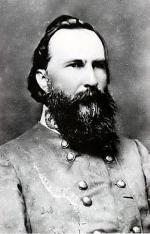Disable ads!
James Longstreet
James Longstreet United States Minister to the Ottoman Empire In office 1880–1881 Preceded by Horace Maynard Succeeded by Lew Wallace Personal details Signature James Longstreet (January 8, 1821 – January 2, 1904) was one of the foremost Confederate generals of the American Civil War and the principal subordinate to General Robert E. Lee, who called him his "Old War Horse." He served under Lee as a corps commander for many of the famous battles fought by the Army of Northern Virginia in the Eastern Theater, but also with Gen. Braxton Bragg in the Army of Tennessee in the Western Theater. Biographer and historian Jeffry D. Wert wrote that "Longstreet ... was the finest corps commander in the Army of Northern Virginia; in fact, he was arguably the best corps commander in the conflict on either side." Longstreet's talents as a general made significant contributions to the Confederate victories at Second Bull Run (Second Manassas), Fredericksburg, and Chickamauga, in both offensive and defensive roles. He also performed strongly during the Seven Days Battles, the Battle of Antietam, and until he was seriously wounded, at the Battle of the Wilderness. His performance in semiautonomous command during the Knoxville Campaign resulted in a Confederate defeat. His most controversial service was at the Battle of Gettysburg, where he openly disagreed with General Lee on the tactics to be employed and reluctantly supervised the disastrous infantry assault known as Pickett's Charge. He enjoyed a successful post-war career working for the U.S. government as a diplomat, civil servant, and administrator. However, his conversion to the Republican Party and his cooperation with his old friend, President Ulysses S. Grant, as well as critical comments he wrote in his memoirs about General Lee's wartime performance, made him anathema to many of his former Confederate colleagues. His reputation in the South further suffered when he led African-American militia against the anti-Reconstruction White League at the Battle of Liberty Place in 1874. Authors of the Lost Cause movement focused on Longstreet's actions at Gettysburg as a primary reason for the Confederacy's loss of the war. His reputation in the South was damaged for over a century and has only recently begun a slow reassessment.
 Read more on wikipedia.org Read more on wikipedia.org
 All quotes by James Longstreet All quotes by James Longstreet
 Edit Edit
|

|
|
|
|
|
Background photo by Giuliana
|